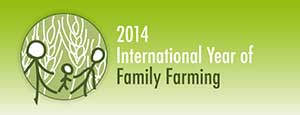
With the launch of the United Nations International Year of Family Farming 2014, IFOAM is calling for concerted action to support and strengthen family farming. Smallholder farmers grow 70% of the world’s food but 50% of the world’s hungry are small farmers. Climate change induced weather extremities such as droughts, floods, destructive rains and winds threaten their farms and livelihoods. Organic agriculture and other agro-ecological models provide science-based solutions to these challenges and can bring prosperity to family and small farmers.
IFOAM welcomes the launch of the International Year of Family Farming (IYFF) conscious of the essential role that families and small farmers play in food production, sustaining rural economies and the stewardship of biodiversity. Attention also needs to be focused on the poverty-stricken circumstances under which many live and suffer.
Smallholders grow 70% of the world’s food and yet, 50% of the world’s hungry are small farmers. Despite the introduction of conventional agriculture in Africa, food production per person is 10% lower now, than in the 1960s. On the other hand, a recent study conducted by economists, agronomists, and international development experts commissioned by the Danish Institute of Agricultural Sciences show that ‘modern non-certified organic farming is a potentially sustainable approach to agricultural development in areas with low yields due to poor access to inputs or low yield potential because it involves lower economic risk than comparative interventions based on purchased inputs and may increase farm level resilience against climatic fluctuations’.
The United National Conference on Trade and Development (UNCTAD) and the United Nations Environment Programme (UNEP) also reports on results from 114 organic agriculture projects in Africa covering 2 million hectares and 1.9 million farmers showing a 116% higher average crop yield on average for all African projects and 128 higher for the projects in East Africa. The UN agencies concluded that ‘organic agriculture can be more conducive to food security in Africa than most conventional production systems, and that it is more likely to be sustainable in the long term’.
With organic farming techniques in soil, water and biodiversity conservation, as well as integrated and sustainable farm management, small farmers can be productive, achieve family food security and improve incomes.
On the occasion of the IYFF 2014 launch, Andre Leu, IFOAM President calls ‘for improved local, national and international policies to promote sustainable organic family and smallholder systems and businesses and for investments in infrastructure, research and technical assistance for supporting them. Authorities as well as donor agencies and international organizations should accelerate their efforts in promoting organic agriculture as a system to empower family and smallholder producers and help them become more resilient, productive and profitable’.
IFOAM is a member of the IYFF 2014 Co-ordination Committee and dedicates a lot of effort to supporting family farmers. The organization and the organic movement are engaged in training and assisting small holders and family farmers to improve their yields through ecological intensification instead of expensive external inputs. Moreover, IFOAM develops tools such as group certification schemes and participatory guarantee systems that fit with small holders needs, in particular in developing countries, to link to both international and domestic markets. Thanks to these tools hundreds of thousands of family farms in India, Uganda, Mexico, Tanzania and Ethiopia have shifted to organic farming and improved their livelihoods.
The President underlines: ‘Organic farming is not farming by neglect. Organic agriculture combines tradition, innovation and science and the adoption of good practice organic systems is delivering significant increases in yields and prosperity to small holder farmers.’
Read more at www.ifoam.org/en/core-advocacy-campaigns/family-farming
